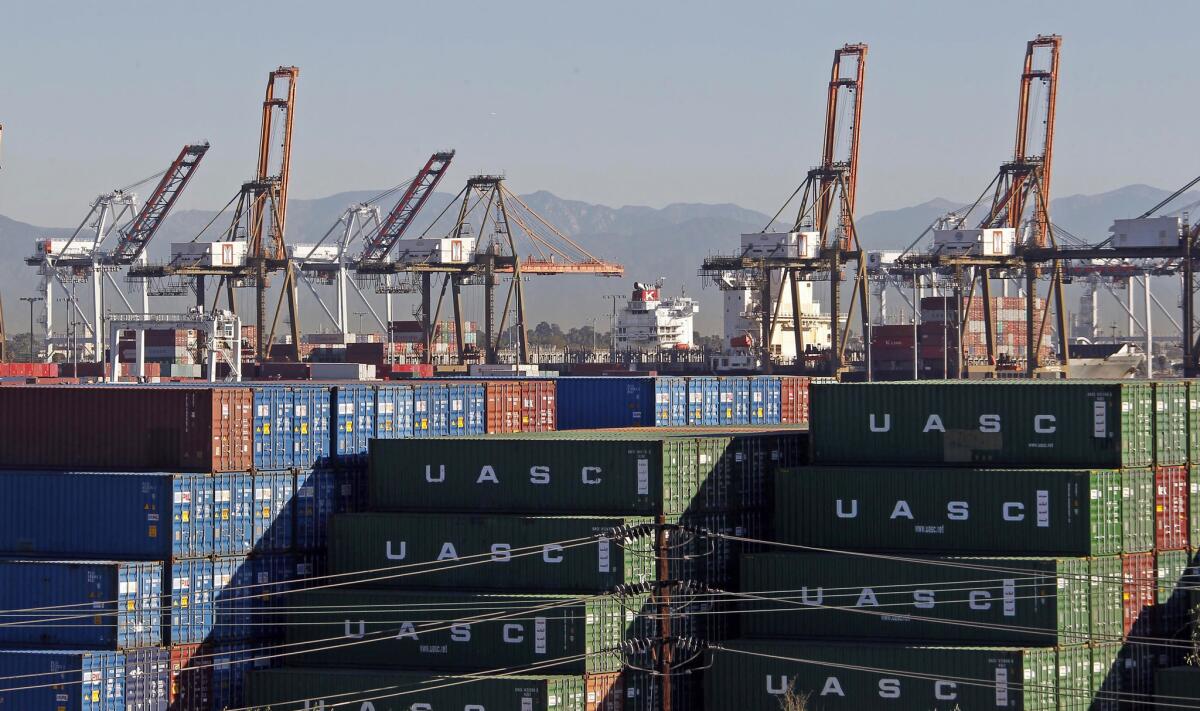IMF lowers U.S. economic forecast, warns of risks of anti-trade policies

- Share via
Reporting from Washington — The International Monetary Fund on Tuesday downgraded its forecast for the U.S. economy and warned that “persistent stagnation” here and abroad could add more fuel to a populist backlash against trade and immigration that would further stifle growth.
In its quarterly World Economic Outlook, the IMF significantly cut its estimate for U.S. growth this year, to 1.6% from a July estimate of 2.2%.
The global economy will expand 3.1% this year, it said — the same as forecast in July.
The IMF described worldwide growth as “subpar,” with a slowdown in the U.S. and other advanced economies being offset by slightly stronger output in developing and emerging nations.
“Taken as a whole, the world economy has moved sideways,” said IMF Chief Economist Maurice Obstfeld.
The report said that a stagnating global economy and the “precarious nature” of the recovery from the 2008 financial crisis risked policies that “would hamper productivity, growth and innovation.”
“It is vitally important to defend the prospects for increasing trade integration,’’ Obstfeld said. “Turning back the clock on trade can only deepen and prolong the world economy’s current doldrums.”
Turning back the clock on trade can only deepen and prolong the world economy’s current doldrums.
— IMF Chief Economist Maurice Obstfeld
The comments were partly a reference to the policies of Republican presidential nominee Donald Trump. Trump has criticized U.S. trade deals with Mexico and China and wants tougher immigration policies.
The IMF report didn’t mention Trump specifically. But it said that “anti-immigrant and anti-trade rhetoric have been prominent from the start of the current [U.S.] presidential election round,” and that there has been “pressure to adopt populist, inward-looking policies” around the world, citing the recent British vote to leave the European Union as an example.
Democratic presidential candidate Bernie Sanders also was sharply critical of trade deals during the primaries. And Democratic nominee Hillary Clinton has said she does not support the sweeping Trans-Pacific Partnership trade deal negotiated by the Obama administration.
“Globally, concerns are growing about political discontent, income inequality and populist policies, threatening to derail globalization,” the IMF said.
The IMF was created near the end of World War II to foster economic cooperation. It has 189 member countries, and its goals include facilitating international trade, improving financial stability and reducing poverty.
The downgrade in the U.S. forecast came after “a disappointing first half caused by weak business investment and diminishing pace of stockpiles of goods,” the IMF said.
U.S. growth is expected to improve to 2.2% next year. But that’s still tepid and down 0.3 percentage points from the July estimate.
The U.S. economy expanded at just a 1.1% annual rate from January through June. Economists expect growth to rebound in the second half of the year.
Federal Reserve policymakers last month forecast the U.S. economy would grow 1.8% this year and 2% in 2017.
The IMF predicted that global economic output would pick up slightly next year, expanding at a 3.4% pace, boosted by recoveries in Russia and Brazil.
China’s economy, the world’s second-largest after the U.S, is expected to continue to slow following 6.9% growth last year. The IMF forecast a 6.6% expansion this year and 6.2% next year.
Follow @JimPuzzanghera on Twitter
ALSO
U.S. subpoena tests privacy promise of encrypted messaging app Signal
Pound drops to lowest level since 1985 — and U.K. stocks soar
Spectrum is here -- get ready for your cable bill to go up
More to Read
Inside the business of entertainment
The Wide Shot brings you news, analysis and insights on everything from streaming wars to production — and what it all means for the future.
You may occasionally receive promotional content from the Los Angeles Times.











